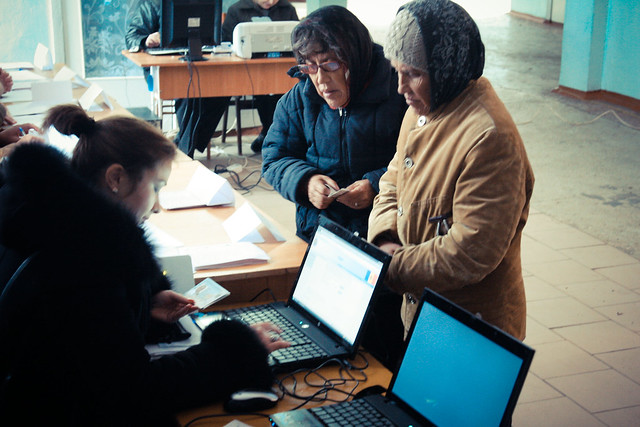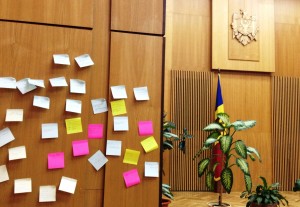Challenges and Opportunities of Open Data in Moldova
As shown in the Open Data Index, Moldova made impressive progress in opening up government information, ranking 12th out of 70 countries assessed in the index. This is largely thanks to the e-Government Centre which led the country through a process of e-transformation, including the adoption of many e-services, the implementation of an open data portal with over 700 data sets, and joining the Open Government Partnership (OGP) in 2012. However, Moldova has a long way ahead in terms turning data into knowledge by stimulating the demand and feedback from civil society, mass media and businesses.
Last week I was invited to run a small workshop with both government and civil society representatives and to discuss how they can build on existing work and make Moldova a true leader of open data in the region and beyond.
One of the first things we did was to map challenges and opportunities of open data in Moldova through a participatory exercise. While participants recognized and truly believed in the opportunities of open data, they also raised numerous challenges on the entire spectrum from supply to demand.
- More informed and active citizenry and mass media
- Better policies through public participation and oversight
- Improved internal mechanisms within the government
- Improved government image and more trust in public institution
- Supports the fight against corruption
- Stimulate business and innovation
##Challenges:
At the level of technical infrastructure
- High cost of digitization
- Most data is not available in electronic format
- Data is outdated or irrelevant
- Lack of proper IT infrastructure in some institution
- Varied capacity and efficiency to process data among institutions
At the institutional, administrative level
- Weak or vague regulations on what data to open and how to do it
- Lack of political will in some ministries
- Fear of exposing corruption or wrong doing
- Lack of human resources and capacity to elaborate and open data
- Lack of proper collaboration mechanism among institutions
- Lack of mechanisms to award those who perform well and sanction those who lag behind
At the level of demand
- Lack of well articulated demand from civil society
- Lack of culture of opening and consuming data
- Often data is mis-interpreted
- Limited access to technologies
- Low capacity to make use of open data (analysis, providing feedback, etc.)
What I learned
Undoubtedly, there is a window of opportunity now in Moldova – there are numerous leaders from both government and civil society who have extensive experience and passion for open government and are eager to learn more and collaborate.
- Civil society organisations, journalists and businesses need to keep using the data available and push the government to release more data that is truly open: data which can be freely used, reused, and redistributed, by anyone, anywhere, for any purpose (see http://opendefinition.org/)
- The government needs to keep working to improve internal processes and workflows and invest in training and tools to ensure ease of collection and release of open data in open and useful formats.
- There is a strong need of conveners who can bring together and stimulate collaboration between government institutions, CSOs, journalists, tech enthusiasts, businesses, etc. In particular, collaboration should be stimulated on specific sectors such as education, environment, etc.
- There is a thirst for international examples and best practices: from successes and examples of innovative uses of open data to stimulate the demand through to examples of internal processes, policies and workflows used by other governments.



